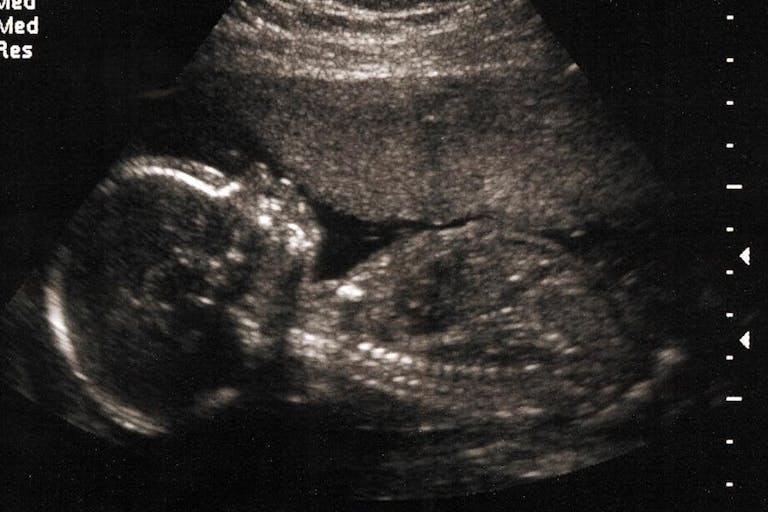
Baby Angel’s arms and legs were torn from his body. Police refuse to investigate.
Nancy Flanders
·
Abortion activist: Since some preemies die, it should be legal to kill any preborn baby
Abortion supporters responding to the Texas Heartbeat Act, which restricts abortion to before a preborn child’s heartbeat can be detected, have predictably twisted the truth and concealed facts. Abortion industry leader Planned Parenthood peddled a pack of lies about the law, including dubious stories about supposed patients, while the media helped cover up the scientific facts about prenatal heartbeats.
The latest offering comes from Trish Zornio at the Pennsylvania Capital-Star. While Zornio accused pro-lifers of ignoring science to push an agenda, it was Zornio who played fast and loose with facts.
Fetus or baby?
“Anti-abortion activists love to tell you you’re killing babies, yet there are at least four distinct scientific terms relating to human development that should not be used interchangeably: zygote, embryo, fetus and baby,” Zornio said. “A zygote is an egg cell that has been fertilized with a male gamete, or sperm… After fertilization, the zygote will form into a blastocyte and then an embryo. This cluster of cells begins to map head versus tail and primitive systems. Only after the eighth week of pregnancy is the term fetus applied.”
This is true on the surface. But what Zornio doesn’t acknowledge is that these are merely descriptors for stages of development, and the terminology doesn’t stop changing once a child has been born. After birth, human beings can be referred to by any number of things: newborn, infant, toddler, teenager, adult, senior. None of them mean that it’s acceptable to take that person’s life at one point or another, nor do these labels rob the person of humanity.

A preborn child may very well be a zygote or an embryo at the very start of their existence. It doesn’t mean they are not human beings. And when those zygotes and embryos are labeled “wanted,” no one disputes referring to them as babies.
Lying about heartbeats… again
A favorite claim of abortion advocates is that a preborn child doesn’t have a real heartbeat. “At six weeks, the embryo — not fetus — does not have a fully functioning heart,” Zornio wrote. “Instead, an ultrasound detects electrical activity in localized primitive cells of the embryo that will later go on to develop into a full cardiac system.”
This has literally no bearing in scientific reality, which is ironic, considering Zornio’s entire op-ed accused pro-lifers of ignoring science, while purporting to give the facts.
The Endowment for Human Development (EHD), a non-partisan organization dedicated to improving health science education and which has a vow of neutrality on controversial bioethical issues like abortion, has made it clear that the preborn child has an actual beating heart — complete with video. It clearly shows blood pumping through the heart, the chambers changing color as the blood flows at four and a half weeks after fertilization (the heart begins to beat by 22 days).

The heart begins beating this early for a reason. As the EHD explains, it is necessary for further development to take place. Without blood flowing, the child cannot survive and continue to grow. Though Zornio is right that the heart isn’t yet fully functioning (having just two chambers at this early stage, instead of the four it will eventually have), it is still beating and pumping blood throughout the preborn child’s body. This fact is affirmed by the American Pregnancy Association.
Does viability matter?
Zornio moves on to attack the notion of viability (the ability to survive outside the womb). Pro-lifers have pointed out that viability is a meaningless benchmark for several reasons: one, medical science continues to change and evolve, meaning premature babies are able to survive at younger and younger ages. And two, a person’s age doesn’t determine his or her humanity.
“Despite many advances in medicine, fetal viability remains a gray zone under 24 weeks,” Zornio said. “Even at 24 weeks, 30% to 40% of preemies do not survive despite robust medical intervention. It is not until 28 weeks that survival rates reach 80% to 90%, although some that survive will continue to experience long-term symptoms of underdevelopment. Romanticizing potential viability of an embryo or fetus prior to this stage is unscientific and causes much emotional harm.”
It’s true that not all premature infants survive. Not all full-term infants survive either, but it’s hardly an argument for abortion’s legalization. Is it ethical that because some babies might die, people should be allowed to purposely kill them?
Article continues below
Dear Reader,
In 2026, Live Action is heading straight where the battle is fiercest: college campuses.
We have a bold initiative to establish 100 Live Action campus chapters within the next year, and your partnership will make it a success!
Your support today will help train and equip young leaders, bring Live Action’s educational content into academic environments, host on-campus events and debates, and empower students to challenge the pro-abortion status quo with truth and compassion.
Invest in pro-life grassroots outreach and cultural formation with your TRIPLED year-end gift!
As Secular Pro-Life explains, death is regrettably a reality of life, regardless of how old or young someone might be. Some deaths might be natural, some might be accidental. None of them justify intentionally killing someone.
Late-term abortions for… health?
The abortion industry seems to be fully aware that very few people support late-term abortion. Seventy percent of Americans want abortion restricted to the first trimester, and more Americans support the Texas Heartbeat Act than oppose it. This is likely why abortion activists frequently try to claim that later abortions are only carried out due to medical reasons. Zornio tries to make this same argument in her faulty fact check.
“Late-term abortions are overwhelmingly due to health complications or a lack of access to early care,” she claimed. “Evidence-based reform could help eliminate many late-term abortions.”
The truth is, women rarely point to health complications as a reason for their abortions. A 1988 Guttmacher study found that only two percent of women who sought late-term abortions did so because of a health problem with the baby. Another Guttmacher study, published in 2013, said, “[D]ata suggest that most women seeking later terminations are not doing so for reasons of fetal anomaly or life endangerment.” Pro-abortion researcher Diana Greene Foster also stated, according to a report from the Congressional Research Service, that abortions for fetal abnormalities “make up a small minority of later abortion.” In addition, a 2010 paper from Julia Steinberg, of the pro-abortion Bixby Center for Global Reproductive Health, said, “Research suggests that the overwhelming majority of women having later abortions do so for reasons other than fetal anomaly (Drey et al., 2006; Finer et al., 2005, 2006; Foster et al., 2008).”
READ: DEBUNKED: Mainstream media lies about the goals of pro-life laws
According to the 2013 Guttmacher study, women who sought late-term abortions fit a certain profile:
They were raising children alone, were depressed or using illicit substances, were in conflict with a male partner or experiencing domestic violence, had trouble deciding and then had access problems, or were young and nulliparous.
It’s a far cry from the story Zornio spun.
Do women regret abortions?
The last, and again oft-repeated, claim from Zornio is that women rarely regret their abortions. “Over 95% of people who received an abortion said in a five-year follow-up study it was the right choice for them,” she wrote. But is that true?
Zornio was citing the deeply flawed Turnaway Study. It used a biased sample with only 27% of the thousands of women invited to take part actually agreeing to participate. Participation then dropped even further to just 17% in the study’s final year, showing that the study in no way represents the majority of post-abortive women. Those who participated were also recruited specifically by the abortion industry itself, and even then, less than 60% of them responded to the survey five years later. This makes it impossible to know how many of these women did regret their abortions later and may signal that these women actually had negative feelings surrounding the abortion since they were unwilling to discuss it.
Zornio further tried to claim that virtually everyone supports abortion, making pro-lifers look like extremists. “Poll after poll shows the majority of Americans agree that abortions should be legal in all or most circumstances, while only 39% believe they should be illegal,” she said.
This is, again, a typical claim from the abortion industry — and it’s extremely false. In actuality, polls repeatedly show that Americans want abortion to be heavily restricted. Americans overwhelmingly support restricting abortion to the first trimester, saying that they find it morally wrong and that they support laws protecting women, like laws mandating parental consent, waiting periods, and informed consent. This has been found in polls from numerous outlets, including Gallup and Marist.
Zornio closes by saying pregnant women need people in politics to “educate and combat misinformation” and that if they can’t do that, “they ought to cede ground to the women and scientists who are.” Yet her entire article is based on peddling misinformation.
As usual, here we have a pro-abortion fact check that’s almost entirely devoid of facts; it is an attempt to persuade people to support abortion, which is the killing of innocent human beings before birth — and that’s one fact they almost never acknowledge.
“Like” Live Action News on Facebook for more pro-life news and commentary!
Live Action News is pro-life news and commentary from a pro-life perspective.
Contact editor@liveaction.org for questions, corrections, or if you are seeking permission to reprint any Live Action News content.
Guest Articles: To submit a guest article to Live Action News, email editor@liveaction.org with an attached Word document of 800-1000 words. Please also attach any photos relevant to your submission if applicable. If your submission is accepted for publication, you will be notified within three weeks. Guest articles are not compensated (see our Open License Agreement). Thank you for your interest in Live Action News!

Nancy Flanders
·
Analysis
Cassy Cooke
·
Analysis
Cassy Cooke
·
Analysis
Bridget Sielicki
·
Analysis
Cassy Cooke
·
Analysis
Cassy Cooke
·
Analysis
Cassy Cooke
·
Analysis
Cassy Cooke
·
International
Cassy Cooke
·
Analysis
Cassy Cooke
·
Analysis
Cassy Cooke
·